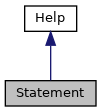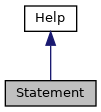

Static Public Member Functions | |
| Clean () | |
| Cleanup any SQL statement index entries that no longer have any routines/classes associated with them. | |
| _.Library.Status | ClearAll () |
| Clear SQL statistics for all query plans in this namespace. More... | |
| _.Library.Status | ClearRelation (_.Library.String pRelation) |
| Clear SQL statistics for all query plans for the relation provided in pRelation More... | |
| _.Library.Status | ClearSchema (_.Library.String pSchema) |
| Clear SQL statistics for all query plans for the schema name provided in pSchema More... | |
| _.Library.Status | ClearStatement (_.Library.String pStatementHash) |
| Clear SQL statistics for all query plans with the statement hash id provided in pStatementHash More... | |
| _.Library.Status | ExportAllFrozenPlans (_.Library.String Filename) |
| Exports all SQL Statement Index entries in this namespace, including query plans. More... | |
| _.Library.Status | ExportFrozenPlans (_.Library.String Filename, _.Library.String Hash) |
| Export an SQL Statement Index entry, including query plan. More... | |
| _.Library.Status | FreezeAll () |
| Freeze all query plans in this namespace. More... | |
| _.Library.Status | FreezeRelation (_.Library.String relation) |
| Freeze all query plans for the relation More... | |
| _.Library.Status | FreezeSchema (_.Library.String schema) |
| Freeze all query plans for the schema More... | |
| _.Library.Status | FreezeStatement (_.Library.String hash) |
| Freeze the query plan with the statement hash provided in hash More... | |
| _.Library.Status | ImportFrozenPlans (_.Library.String Filename, _.Library.Boolean Display) |
| Import a file containing SQL Statement Index entries. More... | |
| _.Library.Status | UnfreezeAll (_.Library.Boolean upgradeOnly) |
| If upgradeOnly is false, unfreeze all query plans that are marked Frozen/Explicit or Frozen/Upgrade. More... | |
| _.Library.Status | UnfreezeRelation (_.Library.String relation, _.Library.Boolean upgradeOnly) |
| If upgradeOnly is false, unfreeze all query plans for the relation that are marked Frozen/Explicit or Frozen/Upgrade. More... | |
| _.Library.Status | UnfreezeSchema (_.Library.String schema, _.Library.Boolean upgradeOnly) |
| If upgradeOnly is false, unfreeze all query plans for the schema that are marked Frozen/Explicit or Frozen/Upgrade. More... | |
| _.Library.Status | UnfreezeStatement (_.Library.String hash, _.Library.Boolean upgradeOnly) |
| If upgradeOnly is false, unfreeze the query plan with the statement hash provided in hash if it's marked Frozen/Explicit or Frozen/Upgrade. More... | |
 Static Public Member Functions inherited from Help Static Public Member Functions inherited from Help | |
| _.Library.String | Help (_.Library.String method) |
| This is a helper class that is used by the various SYSTEM classes to provide a Help method. More... | |
|
static |
Clear SQL statistics for all query plans in this namespace.
Example: set st=$SYSTEM.SQL.Statement.ClearAll()
|
static |
Clear SQL statistics for all query plans for the relation provided in pRelation
Parameter:
|
static |
|
static |
|
static |
Exports all SQL Statement Index entries in this namespace, including query plans.
Generated file can be loaded using $SYSTEM.SQL.Statement.ImportFrozenPlans().
The main reason to export/import an SQL Statement entry is to move a frozen plan from one location to another.
Other than moving a frozen plan, there is not much benefit of moving an SQL Statement definition from one location to another. When exporting SQL Statement definitions, the Locations (routines) the SQL Statement is defined in is not exported. This is because it is possible the Locations are different or don't exist on the target system. Recompiling the class/routines that contain the SQL Statement on the target system will redefine the Location entries for the SQL Statement definition.
Any SQL Statements the current user does not have privilege to run will not be exported.
Parameter:
Examples:
|
static |
Export an SQL Statement Index entry, including query plan.
Generated file can be loaded using $SYSTEM.SQL.Statement.ImportFrozenPlans().
The main reason to export/import an SQL Statement entry is to move a frozen plan from one location to another.
Other than moving a frozen plan, there is not much benefit of moving an SQL Statement definition from one location to another. When exporting SQL Statement definitions, the Locations (routines) the SQL Statement is defined in is not exported. This is because it is possible the Locations are different or don't exist on the target system. Recompiling the class/routines that contain the SQL Statement on the target system will redefine the Location entries for the SQL Statement definition.
If the current user is not privileged to execute this SQL Statement, a privilege error will be returned and the export will not occur.
Parameter:
Examples:
|
static |
Freeze all query plans in this namespace.
Example: set st=$SYSTEM.SQL.Statement.FreezeAll()
|
static |
Freeze all query plans for the relation
Example: set st=$SYSTEM.SQL.Statement.FreezeRelation("XLT.Person")
|
static |
Freeze all query plans for the schema
Example: set st=$SYSTEM.SQL.Statement.FreezeSchema("XLT")
|
static |
Freeze the query plan with the statement hash provided in hash
Example: set st=$SYSTEM.SQL.Statement.FreezeStatement("3DgIqc72NS+Np6nybddb719NKb8=")
|
static |
Import a file containing SQL Statement Index entries.
Files can be loaded that were generated with $SYSTEM.SQL.Statement.ExportStatement() or $SYSTEM.SQL.Statement.ExportAllStatements().
The main reason to export/import an SQL Statement entry is to move a frozen plan from one location to another.
Other than moving a frozen plan, there is not much benefit of moving an SQL Statement definition from one location to another. When exporting SQL Statement definitions, the Locations (routines) the SQL Statement is defined in is not exported. This is because it is possible the Locations are different or don't exist on the target system. Recompiling the class/routines that contain the SQL Statement on the target system will redefine the Location entries for the SQL Statement definition.
Parameter:
Examples:
|
static |
If upgradeOnly is false, unfreeze all query plans that are marked Frozen/Explicit or Frozen/Upgrade.
This is the default.
If upgradeOnly is true, unfreeze all query plans that are marked Frozen/Upgrade Example: set st=$SYSTEM.SQL.Statement.UnfreezeAll()
|
static |
If upgradeOnly is false, unfreeze all query plans for the relation that are marked Frozen/Explicit or Frozen/Upgrade.
This is the default.
If upgradeOnly is true, unfreeze all query plans for the relation that are marked Frozen/Upgrade Example: set st=$SYSTEM.SQL.Statement.UnfreezeRelation("XLT.Person")
|
static |
If upgradeOnly is false, unfreeze all query plans for the schema that are marked Frozen/Explicit or Frozen/Upgrade.
This is the default.
If upgradeOnly is true, unfreeze all query plans for the schema that are marked Frozen/Upgrade Example: set st=$SYSTEM.SQL.Statement.UnfreezeSchema("XLT")
|
static |
If upgradeOnly is false, unfreeze the query plan with the statement hash provided in hash if it's marked Frozen/Explicit or Frozen/Upgrade.
This is the default.
If upgradeOnly is true, unfreeze the query plan with the statement hash provided in hash if it's marked Frozen/Upgrade Example: set st=$SYSTEM.SQL.Statement.UnfreezeStatement("3DgIqc72NS+Np6nybddb719NKb8=")